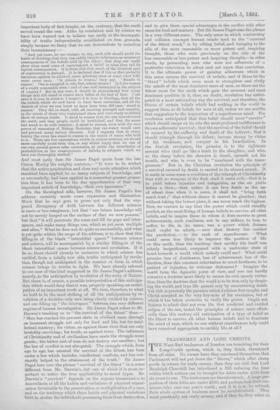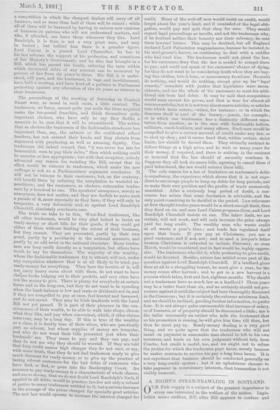TRADESMEN AND LONG CREDITS.
THE West-End tradesmen of London are trembling for their Long-Credit system, which is, they think, threatened from all sides. No sooner have they convinced themselves that Parliament will not put down the " Stores," which offer cheap goods in return for ready-money, than they are told that Lord Randolph Churchill has introduced a Bill reducing the time within which actions can be brought for debts under k100 from six years to one. The tradesmen are thunderstruck. A large pro- portion of their debts are under £100, and perhaps half their cus- tomers take over one year's credit ; and if it is to be refused, their whole system of business must be revolutionised. They must practically ask ready-money, and if they do, they cuter on
a competition in which the cheapest dealers will carry off all business, and so more than half of them will be ruined, while all of them will be harassed by having to enforce new customs Of business on patrons who will not understand matters, and who, if offended, can leave them whenever they like. Lord Randolph, it is true, is not a very great man, and may be beaten ; but behind him there is a grander figure. Lord Cairns is a passed Lord Chancellor, he has in his law reforms the support of his profession, and sometimes of her Majesty's Government; and he also has brought in a Bill, which has passed the Lords, reducing the term within which unsecured debts of any amount can be recovered by process of law from six years to three. His Bill, it is under- stood, will pass, and the tradesmen, in rage and bewilderment, have held a meeting, and have fired off a petition to Parliament protesting against any alteration of the six years as ruinous to their businesses.
The proceedings at the meeting of Saturday in Conduit Street were, as usual in such cases, a little comical. The tradesmen, we fancy, cannot quite put aside the ideas acquired under the ten-pound franchise, and think themselves quite importaut electors, who have only to say they dislike a measure to be sure, that it will be reconsidered. The notion that as electors the tradesmen of the fashionable streets are less important than, say, the cabmen or the certificated school teachers, has not entered their heads, and they abstain from argument with perplexing, as well as amusing, dignity. One tradesman did indeed remark that "it was never too late for honourable men to pay their debts," than which nothing could be sounder or less appropriate ; but with that exception, nobody advanced any reason for resisting the Bill, except that its effect wonld be ruinous to tradesmen, which under the new suffrage is not as a Parliamentary argument conclusive. It will not be ruinous to their customers, but, on the contrary, will benefit them by reducing the temptation to wasteful ex- penditure ; and the customers, as electors, outnumber trades- men by a hundred to one. The speakers' annoyance, merely as annoyance, does not matter, and. they are foolish to make such a parade of it, more especially as they have, if they will only be temperate, a very defensible and, as against Lord Randolph Churchill, absolutely conclusive case.
The truth we take to be this., West-End tradesmen, like all other tradesmen, would be very glad indeed to insist on ready-money or short bills for their goods, if they could get either of them without limiting the extent of their business, but they cannot. They are prevented, partly by their own greed, partly by a peculiarity in the national manners, and partly by an odd twist in the national character. Many trades- men use long credit directly as a temptation, but others have much to "say for themselves. The majority of the wealthy, whom the fashionable tradesmen try to attract, will not, under any compulsion whatever that is at all likely to be tried, pay ready-money for everything. They hate the trouble of it, will not carry heavy sums about with them, do not want to have eheCine-books bulging out in their pockets, and very often have not the money to give. There is plenty for everybody at certain times and in the long-run, but they do not want to be spending when the bank-balance is low and rents or dividends not in, and if they are compelled to pay at once, feel hunted and harassed, and do not spend. They may be Irish landlords with the Land Bill not yet passed. It is part of their pleasure in the con- sciousness of their wealth, to be able to walk into shops, choose what they like, and pay when convenient, which, if other claims intervene, may be a long day. If this is true of the wealthy as a class, it is doubly true of their wives, who are practically just as solvent, but whose supplies of money are irregular, and who do not want their bills presented just when their husbands' are. They mean to pay and they can pay, and they do not see why they should be worried. If they are told that long credit means high charges they do not care, or say,
with some truth, that they do not find tradesmen ready to give
intih discount for ready-money, or to give up the practice of taxing solvent customers for the bad debts of customers who have died., or fled, or gone into the Bankruptcy Court. Au aversion to Pay ready-money is a characteristic of whole classes, and one so strong, that we do not doubt Lord Randolph's limit, if applied to all debts, would in practice involve not only a refusal of justice to many tradesmen entitled to it but a serious increase in the average of the prices charged for specially good articles. The new law would operate to increase the interest charged for credit. Many of the well-off men would insist on credit, would forget about the year's limit, and if reminded of the legal obli- gation, would pay and quit that shop for ever. They would regard legal proceedings as insults, and ask the tradesman why, if he doubted neither their honesty nor their solvency, he sent them lawyers' letters. This may be doubted, but all England declared Lord Palmerston magnanimous, because ho insisted, to his stud-groom's horror, on continuing to deal with a saddler who had sued him. The tradesman could not plead the law, for his customers deny that the law is needed to compel them to pay; and could not speak of his customers' chance of .dying, for they do not want to be considering deatlywhen they arc buy- ing fine clothes, brie-it:brae, or unnecessary furniture, lie could do nothing, and would do nothing, except give up his 'legal remedy," complain with justice that legislators were incon- siderate, and tax the whole of his customers to meet his addi- tional risk from bad debts. It may be said that competition would soon correct his prices, and that is true for almost all common artieles,but it is not true about scarce articles, or articles into which taste enters,—wines, for instance ; or in which the dearness itself is part of the luxury,.-jewels, for example ; or in which one tradesman has a distinctly different repu- tation from another, as is the case with fashionable tailors, milliners, coach-builders, and many others. Such men would be compelled to give a certain amount of credit under any law, or to shut up shop ; and it seems hard that, within certain strict limits, law should be denied them. They virtually contract to deliver things at a high price, and to wait so many years for their money, if required, and there is nothing in the contract so immoral that the law should of necessity condemn it. Suppose they all took six-years bills, agreeing to cancel them if paid beforehand, the law would enforce those bills.
The only reason for a law of limitation on tradesmen's debts is expediency, the experience which shows that it is not expe- dient to encourage people to heap up debts for long periods, and so make their own position and the profits of trade excessively unsettled. After a curiously long period of doubt, a con- sensus has arisen that some limitation is advisable, and the only point remaining to be decided is the period. Law reformers at first thought twelve years would be a short enough limit, then they fixed on six, and now Lord Cairns proposes three, and Lord Randolph Churchill insists on one. The latter limit, we are certain, will not work, and will only increase the price always paid for long credit. The wealthy man who wants credit at all wants a year's time ; and trade has regulated itself upon that basis. If you pay at Christmas, you are a good customer, and if not, not; and to send a lawyer's letter because Christmas is extended to include February, or even March, would be considered, and in fact would be, highly oppres- sive. The tradesman who did it, while professing to give credit, would be deserted. Besides, nature has settled sonic part of the question against Lord Randolph Churchill. If a landlord gives time at all to a struggling tenant, he must give a year, for the money comes after harvest ; and to get in a new harvest is a process which takes, first and last, eighteen months. Why should not a tradesman have as much law as a landlord P Three years may be a better limit than six, and we certainly should not pro- nounce against it until the subject had been thoroughly discussed in the Commons ; but it is certainly the extreme minimum limit, and we should be inclined, pending further information, to prefer four. It is not always quite unreasonable that increase of salary, or of business, or of property should be discounted a little ; nor is the tailor necessarily an outlaw who tolls the lieutenant that as his promotion is coming, he will give him time till then, but then he must pay up. Ready-money dealing is a very good thiug, and we quite agree that the tradesman who will not insist on payment in reasonable time should be left to his own resources, and trade on his own judgment without help from Courts ; but credit is useful, too, and we ought not to refuse the justice for which the tradesman pays taxes, merely because he makes contracts to receive his pay a long time hence. It is not expedient that business should be conducted generally on a very long-credit system ; but if an upholsterer chooses to take payment in reversionary interests, that transaction is not visibly immoral.



































 Previous page
Previous page